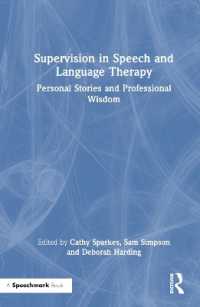- ホーム
- > 洋書
- > 英文書
- > Religion / Ethics
Full Description
Obstacles to Divine Revelation applies a philosophical approach to examining the concept of divine revelation and explores the notion that it may not be a simple matter for God, if there is a God, to give revelation to human beings. Rolfe King argues that there are obstacles to divine revelation and that exploring these leads to a significant clarification of the idea of evidence for God. These obstacles may also account for aspects of divine hiddenness which have not been adequately explored in philosophy of religion or theology. King contends that it is impossible for God to give human beings knowledge of God unless they also have some trust, or faith, in God, and that it is impossible to separate the concept of evidence of possible divine revelation from notions of divine plans. The idea of a necessary structure of revelation, should there be a God who chooses to give revelation, is explored, and it is argued that this leads to Hume's famous argument about miracles being turned on its head. A unique explanation of the narrative power of the incarnation in Christian theology is given, seeing incarnation as part of the best divine plan to overcome obstacles to revelation.
King highlights a new theory of religious truth as part of a suggested wider theory of knowledge which will be of interest to philosophers in both the Anglo-American and continental traditions of philosophy.
Contents
Chapter 1: Initial Reflections; 1.1 Introduction; 1.2 Identifying our topic; 1.3 Comments on method; 1.4 Some key assumptions; 1.5 Adjusting the focus; 1.6 Some illustrations; Chapter 2: The God of History?; 2.1 Recording history; 2.2 Revelation as history; 2.3 Hermeneutics; 2.4 Some general features of obstacles to revelation; Chapter 3: Starting the Process; 3.1 The Eden parable; 3.2 Revelation and necessity; 3.3 Analysing God's options; 3.4 God's limited options; 3.5 Evidence and the best plan; 3.6 Some possible criticisms; Chapter 4: Evidence and Direct Cognition of God; 4.1 Some background; 4.2 Internalism v. Externamlism; 4.3 Models of direct knowledge of the truth of testimony; 4.4 Evaluation of the models; Chapter 5: Knowledge and the Perception of God; 5.1 Can God be perceived?; 5.2 Language games and the name of God; 5.3 Seeing the essence of God; 5.4 Seeing the glory of God; Chapter 6: Knowledge and Obstacles to Direct Cognition; 6.1 Direct cognition: a summary; 6.2 Plantinga and the maximum pace of revelation; 6.3 Obstacles to direct cognition; 6.4 Coherence rationality and union with God; 6.5 A Theory of Knowledge; 6.6 The Eden parable revisited; Chapter 7: Major and Discreet Revelation; 7.1 Great evidence; 7.2 The "Gal" thought-experiment; 7.3 Results and application; 7.4 Obstacles to major revelation; 7.5 Discreet revelation: the best strategy?; Chapter 8: Eschatological Revelation; 8.1 The parable of the Throne and the Seed; 8.2 Judgment and revelation; 8.3 Judgement and the vision of God; 8.4 The general problem of special revelation; Chapter 9: Divine Hiddenness; 9.1 A third factor; 9.2 The choice to hide; 9.3 Obstacles or hiding?; 9.4 Apophatic theology; Chapter 10: The Necessary Structure of Revelation; 10.1 The story so far; 10.2 God's limited opinions: types of divine self-testimony; 10.3 Evidence, divine plans and the "Version B Model"; 10.4 Features of the necessary structure; 10.5 Approaching assurance; 10.6 Miracles and necessity; 10.7 Does Kant make any difference?; Chapter 11: Divine Self-testimony and the Journey to God; 11.1 God and the contemporary debate over testimony; 11.2 Journey-epistemology; 11.3 Two kinds of rationality; 11.4 Traditions and the awakening of the human ideal; 11.5 The knowledge of God: head and heart; Chapter 12: The journey of Faith; 12.1 Confident faith?; 12.2 Choosing to trust?; 12.3 The moral ideal and the journey towards God; 12.4 Faith and reason; Chapter 13: Providence and Revelation; 13.1 The problem of evil; 13.2 Modest theodicy 13.3 Providence and free will; 13.4 Modeling omnipotence; Conclusion; References; Index.








